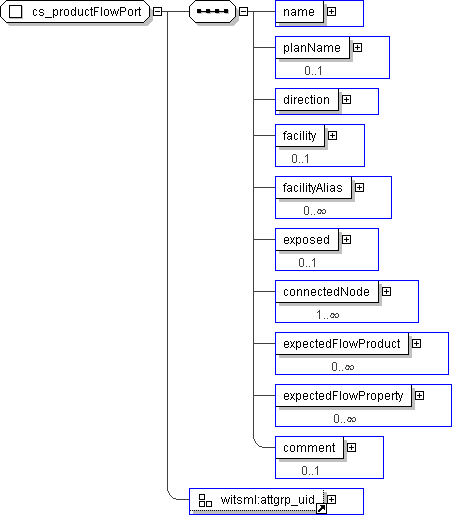
| Super-types: | None |
|---|---|
| Sub-types: | None |
| Name | cs_productFlowPort |
|---|---|
| Used by (from the same schema document) | Complex Type cs_productFlowUnit |
| Abstract | no |
| Documentation | WITSML - Product Flow Port Component Schema. |
'The unique identifier of a container element. This attribute is generally required within the context of a WITSML server. There should be no assumption as to the semantic content of this attribute. This should only be used with recurring container types (i.e., maxOccurs greater than one). The value is only required to be unique within the context of the nearest recurring parent element.'
">'The name of the port within the context of the Product Flow Unit.'
'The name of a network plan. This indicates a planned port. All child network components must all be planned and be part of the same plan. The parent unit must be part of the same plan or be an actual. Not specified indicates an actual port.'
'Defines whether this port is an inlet or outlet. This is a nominal intended direction.'
'The name of the facility represented by this Product Flow Port The name can be qualified by a naming system. The facility name is assumed to be unique within the context of the facility represented by the unit. This also defines the kind of facility.'
'An alternatative name of a facility. This is generally unique within a naming system. The above contextually unique name should also be listed as an alias.'
'True (\"true\" or \"1\") indicates that the port is an exposed internal port and cannot be used in a connection external to the unit. False (\"false\" or \"0\") or not given indicates a normal port.'
'Defines the node to which this port is connected. A timestamp activates and deactivates the connection. Only one connectedNode should be active at any one point in time. There are no semantics for the node except common connection. All ports that are connected to a node with the the same name are inherently connected to each other. The name of the node is only required to be unique within the context of the current Product Flow Network (that is, not the overall model). All ports must be connected to a node and whether or not any other port is connected to the same node depends on the requirements of the network. Any node that is internally connected to only one port is presumably a candidate to be connected to an external node. The behavior of ports connected at a common node is as follows: a) There is no pressure drop across the node. All ports connected to the node have the same pressure. That is, there is an assumption of steady state fluid flow. b) Conservation of mass exists across the node. The mass into the node via all connected ports equals the mass out of the node via all connected ports. c) The flow direction of a port connected to the node may be transient. That is, flow direction may change toward any port(s) if the relative internal pressure of the Product Flow Units change and a new steady state is achieved.'
'Defines the expected flow and product pairs to be assigned to this port by a Product Volume report. A set of expected qualifiers can be defined for each pair.'
'Defines the properties that are expected to be measured at this port. This can also specify the equipment tag(s) of the sensor that will read the value. Only one of each property kind should be active at any point in time.'
'A descriptive remark associated with this port.'
